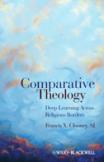A World of Faith
The proximity of religious difference in our globalized world raises new tasks for Christians. As our workplaces, schools and communities are increasingly multireligious, it’s a good idea to have some understanding of the faiths our neighbors profess. But as this volume suggests, our interreligious milieu provides a new impetus not just for learning about our neighbors’ faiths but learning from them. Francis X. Clooney, S.J., is a most trustworthy guide.
Clooney, a professor at Harvard Divinity School, has spent his years as a Jesuit Catholic priest deeply involved in the life and learning of the Hindu religious community. He has written a wide range of volumes on the theological traditions of Hinduism. He demonstrates with his life’s work what it means to cross over into other religious streams and come back home again to one’s own. Sharing the contours of his practice, Clooney provides an overview of the field of comparative theology.
The central process Clooney proposes is that Christians read others’ scriptures under the guidance of expert commentators and then return to their own tradition, where new insights might emerge. There is some elitism embedded in a methodology that expects expertise not only in one’s own tradition, but in another’s as well. Yet Clooney is confident that this reading practice is accessible to a broad audience:
With some focused effort, a Christian reader can pick up and read a Hindu text such as Mutal Tiruvantati 44, trace the use of itwithin the Hindu tradition, re-read it in light of some remembered Christian parallels, then re-read some Christian sources in that new light. In some cases, at least, this complication and expansion of the reading process changes us religiously. We do read; we do learn from what we read; we do ponder our reading; this does affect how we read other texts; and all of this does have a yet deeper effect on how we imagine our encounter with God.
Since scriptures and commentaries from the traditions of the globe are available in translation, it makes sense that they might provide a basic orientation to the faith, even for the outsider. And yet it is questionable just how much understanding can be gained without reference to wider fields of meaning in lived practice, historical memory and a tradition’s interrelated system of symbols. Clooney himself recognizes that text-study and broader engagement with a living tradition are mutually informing in the task of interreligious learning. In arguably the most moving passage of the book, Clooney brings the reader along on one of his frequent visits to Laksmi’s temple in India and the darshan of the Goddess (in which deity and devotee are “seen”). As awkward as the experience may be to fit back into a Christian framework, the experience eventually brings him back to his home tradition in a new way. The book, then, charts the path of the comparative theologian beyond and back, in text and in life.
Comparative Theology also chronicles earlier comparative projects, surely to establish a distance from them but also to recognize how we are indebted to these forerunners. Clooney first identifies with the early Jesuits in mission, whose explicit aim was conversion but who nonetheless hoped to learn as much as possible about the religion of the other. From them we are encouraged to make explicit our faith commitments.
Today’s comparative theology also has roots in the comparative study of religions. In this case, scholars were not interested in converting those whose religion they studied, but in providing careful and detailed scholarship on these traditions. Yet while purporting to be objective, these academics often employed theological judgments to ultimately argue for Christianity as the superior truth. From both trajectories we learn that faith and scholarship can go together, but hear cautionary tales of rushing to “comfortable conclusions.” A spiritually grounded, intellectually rigorous inquiry into another tradition that may destabilize theological certainties is what Clooney has in mind. A chapter devoted to presenting contemporaries who share his inclination as academic theologians interested in interreligious learning demonstrates that this discipline is now emerging as a distinctive field.
Although comparative theology is opening up as a new discipline for theologians in the 21st century, its importance is not merely academic. Nor is it ultimately practical. The primary aim is not simply to get to know the faith of our neighbors. Rather, the importance of this project is deeply theological, culminating in the argument that through the faith of the other we might be opened up in new ways to the mystery that Christians call God. From a deep rootedness in the practice of Christian prayer, Clooney reflects that:
in contemplation we construct a path of religious belonging that suits our own spiritual imagining; we do this according to our traditions but also the possibilities available in our time and place. In all of this, God agrees to meet us there; if our contemplation happens to cross religious boundaries, God agrees to meet us there too.
Although framed as a descriptive account of the new theological task, the text is, finally, a theology in its proper sense: a treatise on the God who wishes to be known, “to be recognized in recognizable terms.” Clooney invites us to witness God being recognized within diverse religious traditions and to be drawn into God’s presence there.
This article also appeared in print, under the headline “A World of Faith,” in the September 27, 2010, issue.








